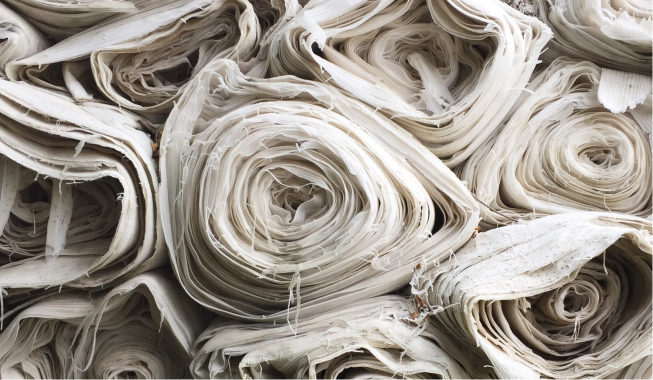Shaping Transformation Sustainably and Resiliently: Resilient Solutions for a Future-Ready Textile Industry
Worldwide, more than two billion tons of waste are generated each year, including a significant amount from textiles and clothing. Driven by numerous new EU regulations, the textile and apparel industry is expected to undergo a fundamental transformation by 2030.

To meet EU regulations, the traditional linear economic model must be transformed into a resource-efficient circular economy, aiming to make products durable and to use waste as raw material for new products. Managing such a transformation is complex, and the textile industry therefore faces major challenges.
RETRAKT investigates how textile and apparel manufacturers can redesign their processes to be resource-efficient, circular, and recycling-friendly—even under uncertain conditions. The interdisciplinary approach of “Resilience Engineering” serves as research framework. The developed instruments and methods will be tested in two practical case studies. A digital collaboration platform is intended to provide technical support for implementing these solutions across the industry.
2.3 Bill.
tons of waste generated worldwide per year
120 M
tons of textile waste generated worldwide per year
12.6 M
tons of textile waste in the EU per year
355 kg
CO₂-emissions per person per year in Europe from textile consumption
1 %
of textiles are recycled into new clothing
2700 l
of water used to produce one cotton T-shirt
2 .1 Bill.
tons of CO₂ emissions in 2018 caused by the global fashion industry
676 M
tons of primary raw materials consumed annually by the EU textile industry
Research Approaches at a Glance
The project partners examine the project topic from various complementary scientific perspectives.
Scientific Background
As part of the European Green Deal, the European Union has set the goal of becoming the first climate-neutral continent by 2050. A key component to achieving this goal is transforming the traditional linear economic model into a resource-efficient circular economy, minimizing waste, excessive resource use, and the consumption of natural raw materials. According to EU requirements, the textile and apparel industry is expected to undergo a fundamental transformation by 2030, shifting from linear to circular production and consumption patterns. Accordingly, the EU Textile Strategy 2030 sets high standards for textiles and apparel placed on the market. In the coming years, numerous new laws and regulations will be introduced both by the EU and by individual member states, specifically targeting the textile and apparel sector in the context of the transition to a circular economy. Managing such complex transformations requires a comprehensive process- and work-science-based approach that considers the interaction of all actors along the textile supply chain. The focus lies on resilience, ensuring that objectives can still be achieved even under challenging conditions.
Companies face the challenge of implementing the transition to a circular economy efficiently, effectively, and sustainably, while minimizing the associated risks. RETRAKT aims to understand and optimize the existing work and process flows of textile and apparel manufacturers operating within the global textile value chain. This will enable them to produce resource-efficient, circular, and recycling-friendly products in the future. Compliance with environmental regulatory requirements under the European Green Deal is a key driver of the transformation to a circular economy in the textile and apparel industry. Implementing this requires effective product compliance management embedded in operational processes. Existing company procedures in areas such as design, procurement, production, and data management must be adapted to meet new legal requirements. Within RETRAKT, resilience engineering provides the systemic framework as well as the analytical and design tools for this transformation. Unlike traditional safety and management approaches, which focus on error prevention and stability, resilience engineering is based on social science research: it places employees and the adaptive performance of organizations at the centre of consideration. The interaction of people and technical systems in operational processes is referred to as a socio-technical system. Resilience engineering addresses the ability of these systems to function successfully under dynamic, uncertain, and complex conditions. Based on practical analyses of existing company processes, the developed tools and methods are tested in practice together with employees. To support the textile and apparel industry technically, a digital collaboration platform is being established.
The project partners examine the project topic from various complementary scientific perspectives.
Resilience Engineering of Complex Socio-Technical Systems
Implementation of Management Methods for Circular Textiles
Innovations at the Industry and Company Level and Science-to-Practice Transfer
Practical Implementation of Methods, Products, and Concepts
Digital Collaboration Platform for Implementation in the Textile Industry
Goals, Perspectives, and Funding

Goal
The RETRAKT project aims to comprehensively understand and optimize the existing work and process flows of textile and apparel manufacturers operating within the global textile value chain, enabling them in the future to produce in a resource-efficient, circular, and recycling-friendly manner.

Perspectives
In the long term, the RETRAKT project aims to expand knowledge on the development of circular value chains in the European context beyond the textile sector. To this end, the project contributes to improving transdisciplinary, transnational, and cross-sector collaboration within existing systems. More generally, knowledge and methods for managing complex projects are to be developed for a wide range of industries and applications.

Funding
The collaborative project “Resilient Transformation Management for Circular Economy in the Textile Sector (RETRAKT)” is part of the funding initiative “Shaping Work in European Collaborative Networks (EuKoNet)” within the ESF Plus program “Future of Work”, which is included in the specialist program “Future of Value Creation – Research on Production, Services, and Work” of the German Federal Ministry of Research, Technology, and Space (BMFTR). The project is managed by the Project Management Agency Karlsruhe (PTKA).